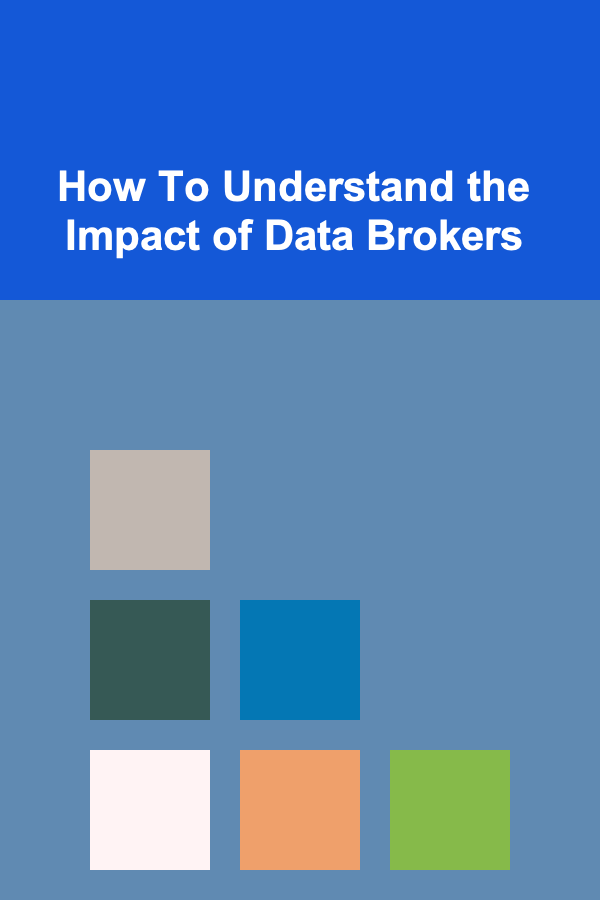
How To Understand the Impact of Data Brokers
ebook include PDF & Audio bundle (Micro Guide)
$12.99$11.99
Limited Time Offer! Order within the next:

In today's digital age, data has become one of the most valuable assets, influencing everything from business decisions to personal privacy. Data brokers, often invisible players in the data-driven economy, are central to the collection, processing, and distribution of vast amounts of personal and behavioral data. But what exactly are data brokers, and how do they impact our lives, society, and even the global economy? In this article, we will explore the role of data brokers, the implications of their operations, and how their influence permeates various sectors.
What Are Data Brokers?
Data brokers are companies or individuals that collect, analyze, and sell data on individuals or groups. They operate by purchasing personal information from various public and private sources, such as social media platforms, credit agencies, surveys, public records, and even online transactions. The information collected typically includes personal identifiers, purchasing behavior, preferences, geographic location, and even psychographic data. After compiling this information, data brokers create detailed profiles, which are then sold to advertisers, marketers, financial institutions, healthcare providers, and other entities that rely on data for decision-making.
Data brokers are often categorized into different groups based on their specialization:
- Consumer Data Brokers -- These brokers gather information related to consumers' purchasing habits, online activities, and demographic details.
- Financial Data Brokers -- Specializing in financial information such as credit scores, loan history, and other financial data.
- Marketing Data Brokers -- These brokers focus on psychographic data and customer behavior for targeted marketing and advertising.
- Health Data Brokers -- They collect and sell health-related information such as insurance details, medical records, and personal health behavior.
- Business Data Brokers -- These brokers collect information about businesses, including financial health, market trends, and competitive intelligence.
The Role of Data Brokers in the Economy
The market for data brokers is massive, with estimates suggesting that the data brokerage industry is worth billions of dollars globally. The data collected is used to create highly refined customer profiles that businesses leverage for targeted marketing, personalized services, and product development. For instance, advertisers use detailed consumer data to create more effective campaigns that are aimed at the right people, at the right time, and through the right channels. Similarly, companies in the financial sector use this data to assess the creditworthiness of potential customers, and healthcare providers might use it to tailor medical services to individuals' needs.
In essence, data brokers help businesses achieve a higher degree of precision in targeting their customers. This can lead to more efficient marketing strategies, improved customer experiences, and cost savings for companies. However, the benefits of data brokers are not solely limited to businesses. Consumers also indirectly benefit from personalized services, discounts, and offers tailored to their preferences and needs.
The Ethical Implications of Data Brokers
Despite their economic value, data brokers operate in a largely unregulated environment, raising significant ethical concerns. One of the key issues is privacy. Data brokers often collect and sell personal information without individuals' explicit consent. For example, personal data from social media platforms may be aggregated and sold, often with little transparency about how that data will be used or who will have access to it.
While some data brokers argue that their activities are in line with privacy regulations and standards, the lack of transparency in how personal data is collected and used often leads to privacy violations. Many individuals are unaware that their data is being sold, let alone how it is being used. In some cases, data brokers have been accused of selling sensitive information that individuals may not have consented to share, such as medical histories or financial records.
Another major ethical issue is the potential for discrimination. By relying on sophisticated algorithms to analyze vast amounts of data, data brokers may unintentionally perpetuate biases and reinforce societal inequalities. For example, targeting advertisements based on demographic data could result in certain groups being unfairly excluded or disproportionately targeted by certain offers. Moreover, profiling individuals based on their personal characteristics, such as race, gender, or income, could perpetuate stereotypes or lead to discriminatory practices in areas like hiring, lending, and insurance.
How Data Brokers Affect Privacy and Security
The privacy implications of data brokers are profound. Because data brokers collect massive amounts of personal information, including sensitive data, there is a significant risk that this data could be exposed in the event of a security breach. For example, in 2017, the data broker Equifax suffered a breach that exposed the personal data of over 140 million individuals, including Social Security numbers, birth dates, and addresses. Such breaches raise serious concerns about the safety of personal data in the hands of data brokers and their ability to protect it from malicious actors.
Moreover, the aggregation of personal data can make individuals more vulnerable to identity theft and fraud. As data brokers amass large datasets that contain personal identifiers, hackers could use this information to impersonate individuals and commit financial crimes. This can lead to significant financial and emotional harm to the victims.
While data brokers claim to use encryption and other security measures to safeguard the data they collect, the sheer volume of data they handle, combined with the number of entities involved in data transactions, means that the risk of exposure is high. Additionally, the fact that many consumers are unaware of the existence of these brokers makes it harder for them to take proactive steps to protect their privacy.
Legal and Regulatory Landscape
Given the growing concerns around privacy and data security, some governments and organizations have started to address the role of data brokers through legislation and regulation. In the United States, for example, the Federal Trade Commission (FTC) has taken steps to regulate the data brokerage industry, including issuing reports on the practices of data brokers and recommending greater transparency and accountability in data collection.
In the European Union, the General Data Protection Regulation (GDPR) has provided individuals with more control over their personal data, including the right to access, correct, and delete their data. The GDPR also requires data brokers to obtain explicit consent from individuals before processing their data. However, enforcement of these regulations has been uneven, and many data brokers continue to operate in a gray area, where they can circumvent the rules by relying on loopholes or by operating outside the jurisdiction of specific regulations.
Despite these regulations, the effectiveness of current privacy laws in curbing the influence of data brokers remains limited. There are still significant gaps in data protection laws, especially in countries where consumer privacy laws are less stringent. Furthermore, the increasing complexity of global data flows means that data brokers often work across borders, making it difficult for regulatory bodies to enforce laws consistently.
The Influence of Data Brokers on Consumer Behavior
While data brokers primarily serve businesses, their influence extends far beyond the corporate world. By selling consumer data, data brokers indirectly affect the everyday choices and behaviors of individuals. For example, targeted advertising based on an individual's search history, location data, and purchasing behavior can shape consumer decisions by presenting tailored offers and recommendations.
The impact of data brokers on consumer behavior is evident in industries such as retail, entertainment, and even healthcare. Personalized marketing strategies, powered by data brokers, have become commonplace in e-commerce, where businesses use data to recommend products, send targeted promotions, or even influence pricing strategies. This level of personalization can create a more seamless and enjoyable shopping experience but also raises questions about how much influence these brokers have over consumer choices.
Furthermore, the accumulation of personal data can result in information asymmetries, where businesses know more about an individual's preferences and behaviors than the individual themselves. This dynamic can erode trust between consumers and businesses and lead to situations where individuals feel manipulated or exploited.
How to Protect Yourself from Data Brokers
Given the potential risks associated with data brokers, it is crucial for individuals to take steps to protect their personal information. Here are a few tips for safeguarding your privacy:
- Use Privacy Settings: Review and adjust the privacy settings on social media platforms, websites, and apps to limit the amount of personal information you share.
- Opt Out of Data Collection: Many data brokers offer consumers the option to opt out of data collection. While this is not always effective, it can help reduce the amount of data brokers can access.
- Monitor Your Credit and Personal Information: Regularly check your credit report and personal records to identify any unauthorized activity or potential misuse of your data.
- Use Strong Passwords and Two-Factor Authentication: Protect your online accounts with strong passwords and enable two-factor authentication to reduce the risk of your data being stolen.
- Be Cautious with Data Sharing: Be mindful of the information you share online and with third parties. Avoid sharing unnecessary personal data unless it is absolutely required.
Conclusion
Data brokers have a profound impact on the modern world, affecting everything from business operations to personal privacy. While their ability to aggregate and sell data has contributed to efficiencies in marketing and business decision-making, their practices also raise significant ethical, privacy, and security concerns. Understanding the role of data brokers and the potential consequences of their actions is crucial for individuals and policymakers alike. As the digital economy continues to evolve, it is essential that we strike a balance between leveraging the benefits of data and safeguarding the rights of individuals. Only through greater transparency, regulation, and consumer awareness can we ensure that the data broker industry operates in a manner that is ethical, secure, and respects privacy.

How to Clean and Maintain Your Home's Lighting Fixtures
Read More
How to Make a Checklist for Reviewing Website User Experience (UX)
Read More
How to Organize Your Sewing Room for Seamless Projects
Read More
How to Understand Design Trends and Adapt Them
Read More
How to Navigate the Bustling Hubs of London
Read More
Unleashing Your Artistic Potential: A Comprehensive Guide
Read MoreOther Products

How to Clean and Maintain Your Home's Lighting Fixtures
Read More
How to Make a Checklist for Reviewing Website User Experience (UX)
Read More
How to Organize Your Sewing Room for Seamless Projects
Read More
How to Understand Design Trends and Adapt Them
Read More
How to Navigate the Bustling Hubs of London
Read More